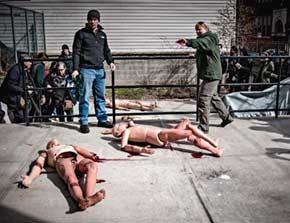 | ■ International
Saving colleagues
拯救同業
Freelance reporters train in combat zone first aid
特約記者接受戰區急救訓練 |
| In an era when news organizations are shutting foreign bureaus to cut costs, more of the dangerous work of reporting from the world's war zones is falling to freelancers, who often must fend for themselves to get the story out and escape alive. | 在新聞機構正在關閉海外分社以削減成本的這個年代,報導全世界各戰區報導這樣比較危險的工作落到了特約記者的身上,他們經常得自已想辦法發出報導,然後活著逃出來。 |
| Preparing freelancers for the dangers of reporting from such places as Afghanistan, Iraq and Syria is the goal of a four-day first-aid training course where reporters learn to treat their injuries and take care of their colleagues in combat-like conditions. The free training provided by Reporters Instructed in Saving Colleagues (RISC), with simulated explosions and gunfire, is vital because much of the front-line reporting today is done by freelancers who often work without the protective resources of major news organizations, said Sebastian Junger, a former war reporter and author who founded the organization. | 一場為期四天的急救培訓課程,教導將到阿富汗、伊拉克和敘利亞等戰地的特約記者學理自已的傷勢,並在模擬戰爭的狀況下照顧同業。這項免費培訓由受訓拯救同業記者組織提供,內容包括模擬爆炸和槍戰。該組織創辦人,曾任戰地記者的現役作家塞巴斯蒂安榮格爾表示,這服務非常重要,因為現在許多前線戰地報告都來自沒有主要新聞機構資源保護的特約記者。 |
| Covering such stories is "a great opportunity for freelancers," said Junger, best known as the author of "The Perfect Storm." ''But the risk is that they're not prepared, they're not trained, and they go into these very volatile situations without the skills that they need." | 以其作品《完美風暴》著名的塞巴斯蒂安榮格爾表示,報導這些故事,「對特約記者來說是一個很好的機會。但風險是,他們尚未做好準備,也沒有受過訓練,他們在沒有所需要技能的狀況下就 投入了這些非常動盪的局面。」 |
| On a recent sweltering day at RISC's South Bronx facility in New York, freelance reporter Danny Gold put his training into practice under conditions designed for maximum chaos. With sweat dripping down his face, and screams and explosions ringing out around him, he quickly pulled a tourniquet from his pack and wrapped it tightly around the leg of the limp victim in front of him. | 在最近一個悶熱天,在受訓拯救同業記者組織位於紐約南布朗克斯區設施裡,特約記者丹尼高特在被設計為最混亂的狀況下進行實地訓練 。滿臉大汗的他,身邊周圍響起了尖叫聲和爆炸聲,他趕緊從背包抽出止血帶,緊緊地包裹著前面一名跛行傷者的腿。 |
| According to the Committee to Protect Journalists (CPJ), recent years have seen record levels of journalists dying in civil unrest and combat situations. Last year, 71 journalists were killed in the line of duty, making it the second deadliest year for journalists on record. Additionally, out of 141 journalists killed since 2010, 43 were freelancers. In 2011, about a third of all journalists killed were freelancers. | 據保護記者委員會指出,近年來死於內亂和作戰中 的記者人數創下歷史新高。去年,有七十一名記者在進行報導時喪生,人數高居史上第二高。此外,自二○一○年以來喪生的一百四十一名記者中,有四十三人是特約記者。在二○一一年, 所有喪生的記者中有大約三分之一是特約記者。 |
| Unlike more traditional hostile environment training courses — which anticipate kidnappings, information security, sexual assault and other challenges — RISC training focuses on basic combat first aid: how to apply a tourniquet, stabilize a fracture or pack a wound. So far, the group has trained 96 journalists. | 有別與傳統針對綁架、性侵、資訊安全等方面的敵對環境培訓 ,受訓拯救同業記者組織的訓練以基本作戰急救為重點:如何使用止血帶、固定骨折或包紮傷口。到目前為止, 該組織已經培訓了九十六名記者。 |
| Gold saw the nature of reporting from dangerous places change firsthand, freelancing in Turkey, Iraq and most recently Syria. "The industry is getting a lot tougher than it was," he said. "But the only other option is to let things go unreported and I think that's not feasible." | 高特親身經歷在危險地方報導的真實情況,他在土耳其、伊拉克,最近也在敘利亞都作過特約 記者。他說:「這個行業比過去困難很多。可是另外唯一的選擇是不去報導這些事,而我認為那是不可行的。」 |
沒有留言:
張貼留言